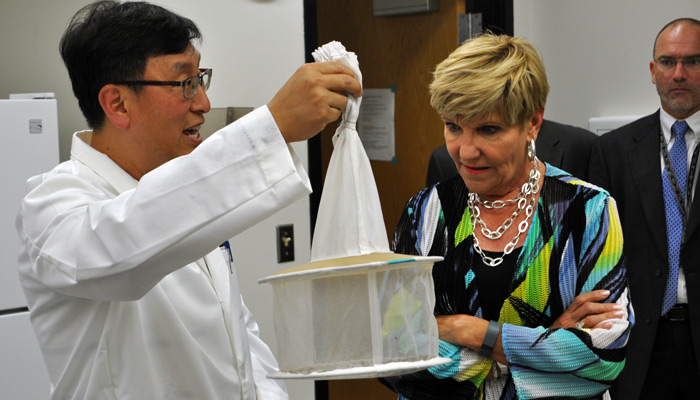UNTHSC teams with city to attack West Nile virus
For the third summer, the city of Fort Worth and UNT Health Science Center will work together on West Nile virus (WNV) surveillance and prevention efforts.
Joon-Hak Lee, PhD, Assistant Professor of Environmental and Occupational Health, and a team of UNTHSC School of Public Health graduate students will be working throughout the summer to collect and analyze mosquitoes from more than 63 local sites at residential areas and parks.
Key spots like the Fort Worth Botanic Garden, Fort Worth Zoo and the Fort Worth Nature Center and Refuge also will be targeted as well.
“The high amount of recent North Texas rains has created saturated soil, and when the moisture content goes up, there is a greater chance for the mosquito population to grow,” Dr. Lee said. “Our temperatures have not been very high yet, which has helped so far, but this could also mean mosquitoes are surviving longer as they conserve energy for the hotter weather to come.”
Monitoring and prevention efforts this year also are being expanded to address the chikungunya virus, first brought to the U.S. in recent years by international travelers and spread from person to person through mosquitoes.
The UNTHSC team’s schedule over the coming months will involve setting traps each Monday, collecting mosquitoes on Tuesdays, conducting lab tests and analysis on Wednesdays and Thursdays, and reporting results and recommendations to Fort Worth officials on Fridays.
A fermented-grass, yeast-type formula is used to attract mosquitoes to the traps, where they lay eggs and can then be collected and monitored.
Tips to protect yourself and your family:
|




![Uyen Sa Nguyen Scaled[58]](https://www.unthsc.edu/newsroom/wp-content/uploads/sites/16/Uyen-Sa-Nguyen-scaled58-145x175.jpg)

Social media